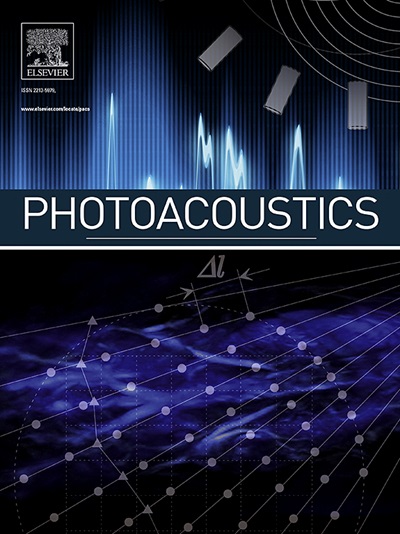Miniature optical fiber photoacoustic spectroscopy gas sensor based on a 3D micro-printed planar-spiral spring optomechanical resonator
IF 7.1
1区 医学
Q1 ENGINEERING, BIOMEDICAL
引用次数: 0
Abstract
Photoacoustic spectroscopy (PAS) gas sensors based on optomechanical resonators (OMRs) have garnered significant attention for ultrasensitive trace-gas detection. However, a major challenge lies in balancing small size with high performance when developing ultrasensitive miniaturized optomechanical resonant PAS (OMR-PAS) gas sensors for space-constrained applications. Here, we present a miniature optical fiber PAS gas sensor based on a planar-spiral spring OMR (PSS-OMR) that is in situ 3D micro-printed on the end-face of a fiber-optic ferrule. Experimental results demonstrate that mechanical vibrational resonance can enhance the sensor's acoustic sensitivity by over two orders of magnitude. Together with a 1.4 μL non-resonant photoacoustic cell, it can detect C2H2 gas concentration at the 45-ppb level, and its response is very fast approximating 0.2 seconds. This optical fiber OMR-PAS gas sensor holds great promise for the detection or monitoring of rapidly varying trace gas in many applications ranging from production process control to industrial environmental surveillance.
基于 3D 微打印平面螺旋弹簧光机械谐振器的微型光纤光声光谱气体传感器
基于光机械谐振器(OMR)的光声光谱(PAS)气体传感器在超灵敏痕量气体检测方面备受关注。然而,在开发用于空间受限应用的超灵敏微型光机械谐振 PAS(OMR-PAS)气体传感器时,如何在小尺寸与高性能之间取得平衡是一大挑战。在这里,我们展示了一种基于平面螺旋弹簧 OMR(PSS-OMR)的微型光纤 PAS 气体传感器,该 OMR 是在光纤套圈的端面上原位三维微打印的。实验结果表明,机械振动共振可将传感器的声学灵敏度提高两个数量级以上。该传感器与 1.4 μL 非共振光声单元配合使用,可检测 45ppb 级的 C2H2 气体浓度,其响应速度非常快,约为 0.2 秒。这种光纤 OMR-PAS 气体传感器在检测或监测快速变化的痕量气体方面大有可为,应用范围从生产过程控制到工业环境监测。
本文章由计算机程序翻译,如有差异,请以英文原文为准。
求助全文
约1分钟内获得全文
求助全文
来源期刊

Photoacoustics
Physics and Astronomy-Atomic and Molecular Physics, and Optics
CiteScore
11.40
自引率
16.50%
发文量
96
审稿时长
53 days
期刊介绍:
The open access Photoacoustics journal (PACS) aims to publish original research and review contributions in the field of photoacoustics-optoacoustics-thermoacoustics. This field utilizes acoustical and ultrasonic phenomena excited by electromagnetic radiation for the detection, visualization, and characterization of various materials and biological tissues, including living organisms.
Recent advancements in laser technologies, ultrasound detection approaches, inverse theory, and fast reconstruction algorithms have greatly supported the rapid progress in this field. The unique contrast provided by molecular absorption in photoacoustic-optoacoustic-thermoacoustic methods has allowed for addressing unmet biological and medical needs such as pre-clinical research, clinical imaging of vasculature, tissue and disease physiology, drug efficacy, surgery guidance, and therapy monitoring.
Applications of this field encompass a wide range of medical imaging and sensing applications, including cancer, vascular diseases, brain neurophysiology, ophthalmology, and diabetes. Moreover, photoacoustics-optoacoustics-thermoacoustics is a multidisciplinary field, with contributions from chemistry and nanotechnology, where novel materials such as biodegradable nanoparticles, organic dyes, targeted agents, theranostic probes, and genetically expressed markers are being actively developed.
These advanced materials have significantly improved the signal-to-noise ratio and tissue contrast in photoacoustic methods.
 求助内容:
求助内容: 应助结果提醒方式:
应助结果提醒方式:


